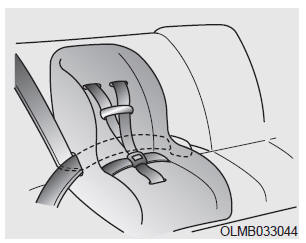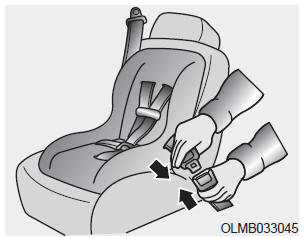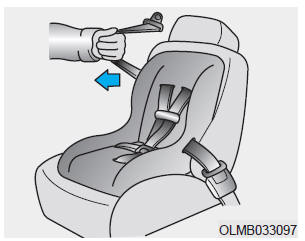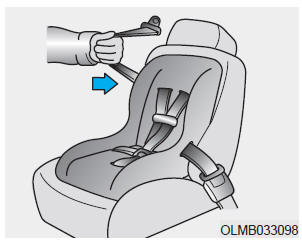Hyundai Sonata: Installing a Child Restraint System (CRS) / Securing a child restraint with a lap belt or lap/shoulder belt
When not using the LATCH system, all child restraints must be secured to a vehicle rear seat with the lap part of a lap/shoulder belt.
WARNING
ALWAYS place a rear-facing child restraint in the rear seat of the vehicle.
Placing a rear-facing child restraint in the front seat can result in serious injury or death if the child restraint is struck by an inflating air bag.
Automatic locking mode

Since all passenger seat belts move freely under normal conditions and only lock under extreme or emergency conditions (emergency locking mode), you must manually pull the seat belt all the way out to shift the retractor to the "Automatic Locking" mode to secure a child restraint.
The "Automatic Locking" mode will help prevent the normal movement of the child in the vehicle from causing the seat belt to loosen and compromise the child restraint system.To secure a child restraint system, use the following procedure.
To install a child restraint system on the rear seats, do the following:
1. Place the child restraint system on a rear seat and route the lap/ shoulder belt around or through the child restraint, following the restraint manufacturer's instructions. Be sure the seat belt webbing is not twisted.
NOTICE
When using the rear center seat belt, you should also refer to the "3-point Rear Center Seat Belt" section in this chapter.

2. Fasten the lap/shoulder belt latch into the buckle. Listen for the distinct "click" sound.
Information
Position the release button so that it is easy to access in case of an emergency.

3. Pull the shoulder portion of the seat belt all the way out. When the shoulder portion of the seat belt is fully extended, it will shift the retractor to the "Automatic Locking" (child restraint) mode.

4. Slowly allow the shoulder portion of the seat belt to retract and listen for an audible "clicking" or "ratcheting" sound. This indicates that the retractor is in the "Automatic Locking" mode. If no distinct sound is heard, repeat steps 3 and 4.
5. Remove as much slack from the belt as possible by pushing down on the child restraint system while feeding the shoulder belt back into the retractor.
6. Push and pull on the child restraint system to confirm that the seat belt is holding it firmly in place. If it is not, release the seat belt and repeat steps 2 through 6.
7. Double check that the retractor is in the "Automatic Locking" mode by attempting to pull more of the seat belt out of the retractor. If you cannot, the retractor is in the "Automatic Locking" mode.
If your CRS manufacturer instructs or recommends you to use a tether anchor with the lap/shoulder belt, refer to the previous pages for more information.
NOTICE
When the seat belt is allowed to retract to its fully stowed position, the retractor will automatically switch from the "Automatic Locking" mode to the emergency lock mode for normal adult usage.
WARNING
If the retractor is not in the "Automatic Locking" mode, the child restraint can move when your vehicle turns or stops suddenly. A child can be seriously injured or killed if the child restraint is not properly anchored in the car, including manually pulling the seat belt all the way out to shift the rectractor to the "Automatic Locking" mode.
To remove the child restraint, press the release button on the buckle and then pull the lap/shoulder belt out of the restraint and allow the seat belt to retract fully.
 Securing a child restraint seat with "Tether Anchor" system
Securing a child restraint seat with "Tether Anchor" system
First secure the child restraint with the LATCH lower anchors or the seat belt.
If the child restraint manufacturer recommends that the top tether strap be attached,
attach and tighten the top teth ...
 Air Bag - Advanced Supplemental Restraint System
Air Bag - Advanced Supplemental Restraint System
1. Driver's front air bag
2. Passenger's front air bag
3. Side air bag
4. Curtain air bag
5. Driver's knee air bag
This vehicle is equipped with an Advanced Supplemental Air Bag System for the
drive ...
Other information:
Hyundai Sonata LF 2014-2019 Owners Manual: Key Ignition Switch
WARNING
NEVER turn the ignition switch to the LOCK or ACC position while the vehicle
is in motion except in an emergency. This will result in the engine turning off
and loss of power assist for the steering and brake systems. This may lead to loss
of directional control and braking function, whi ...
Hyundai Sonata LF 2014-2019 Service Manual: Heater Core Repair procedures
Replacement
1.
Disconnect the negative (-) battery terminal.
2.
After loosening the bolts remove the main crash pad and cowl cross bar assembly together.
(Refer to Heater -"Heater Unit")
3.
Remove the heater core cover (A) after loosening the mounting screws.
4.
Pull out the heater ...
